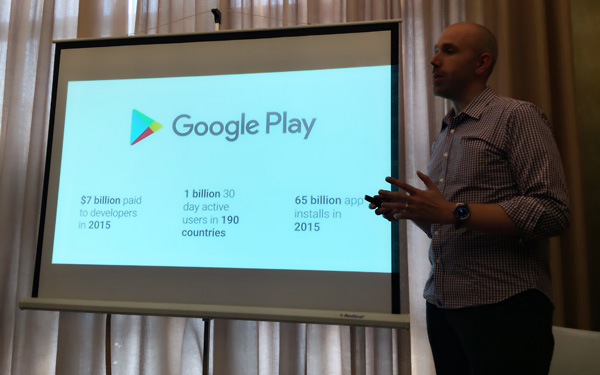Developers' economy sets to boom in China: Google executive
Updated: 2016-08-04 13:09
By Liu Zheng(chinadaily.com.cn)
|
||||||||
 |
|
Ben Galbraith, head of product & developer relations at Google's developer product group, gives a presentation to Chinese media on July 29, 2016 in Shanghai. [Liu Zheng/chinadaily.com.cn] |
When the buzzword changed from "copy to China" to "copying China", pioneers of world's internet industry were impressed by the implementation of mobile internet and mobile applications created in the country.
Ben Galbraith, head of product & developer relations at Google's developer product group, sat down with China Daily and shared his views on the business potential of Chinese developers, China-made mobile applications and Google's Daydream development potential in the emerging market.
Taking WeChat as an example, Galbraith said that the whole world, including the Silicon Valley, has a lot to learn from the application.
 |
|
Ben Galbraith, head of product & developer relations at Google's developer product group [Photo provided to chinadaily.com.cn] |
Galbraith and his team from Mountain View, California, spent two months meeting with Chinese mobile internet enterprises and app developers in the Chinese mainland.
"As we spend time with the WeChat team, I was really impressed to see the local talents in the industry and how good those teams are," Galbraith said.
According to Galbraith, as Chinese developers start to bring more innovation to rest of the world, it's hard to put a limit on the potential it will have in revolutionizing other markets and industries, just like it has transformed the whole industry in China.
Some of the other important tasks during his visit to China were to collect feedback as well as have further communications with the existing users of the company's developer-support platforms, such as "Cloud Platform" and the newly launched "Firebase", and understand requirements from the large amount of people.
Latest statistics from Google said that last year, Google Play, the digital distribution service operated and developed by the company, generated 1 billion 30-day active users in 190 countries and 65 billion app installs, contributing $7 billion profits to its developers.
"We do have a long list of the additional features that developers want to add to the product (Firebase), so we're at the process of busily adding new capabilities to it," said Galbraith.
Given the large amount of suggestions and requirements received from the developers, the toughest job for him was to select the best choices.
The US tech giant started to work with Chinese developers to distribute its apps through Google Play in late 2014.
"Some of our most successful developers today are Chinese ones who export apps and games to the rest of the world," said Galbraith.
 |
|
Clay Bavor, vice-president of virtual reality at Google, introduces Daydream during the Google I/O 2016 developers conference in Mountain View, California, May 18, 2016. [Photo/Agencies] |
According to analysis company App Annie, the US is currently the largest and most important foreign market for Chinese game developers distributing their works. From January to May, 20 percent of the overseas installation came from the US, generating 30 percent of the overseas gross earnings.
There was a 150 percent increase in profit compared to the same time period last year. Emerging markets, including India, Indonesia, Vietnam, Mexico and Turkey, have become other new growth drivers for Chinese developers.
Wei Fangdan, CEO of baijingapp.com, an online community that covers more than 40,000 domestic "go global" developers, said Chinese mobile app developers started eyeing foreign market since 2012 and most of the early products are "tools apps" that focus on cache cleaning, anti-virus, data transferring and management, mobile desktop and screen locker.
- Chinese scientists claim possible breakthrough in HIV, hepatitis cure
- Connection lost: does technology make long distance dating harder?
- Chinese firm reports record-breaking optic fiber transmission
- Travel in space poised to spread its wings
- Tibet envisioned as hub of Himalayas
- Health certificate steps reduced for foreigners
- Nepal's newly elected PM takes oath
- Texas gun law worries incoming students
- China vows to deepen economic, trade cooperation with ASEAN
- Fire guts Emirates jet after hard landing; 1 firefighter dies
- Egypt's Nobel-laureate scientist dies of illness in US
- THAAD muscle flexing unmasks anxiety over declining hegemony

 Ace swimmers make record-breaking splash in Rio
Ace swimmers make record-breaking splash in Rio
 Chinese weightlifter Long smashes world record
Chinese weightlifter Long smashes world record
 China wins first diving gold of Rio Games
China wins first diving gold of Rio Games
 Fancy diving and mahjong at same time? No problem
Fancy diving and mahjong at same time? No problem
 Qingdao delights taste buds with seafood delicacies
Qingdao delights taste buds with seafood delicacies
 Big names train for Rio 2016
Big names train for Rio 2016
 Photo exhibition narrates charm of old Beijing
Photo exhibition narrates charm of old Beijing
 Traditional Tibetan handicrafts kept alive in SW China
Traditional Tibetan handicrafts kept alive in SW China
Most Viewed
Editor's Picks

|

|

|

|

|

|
Today's Top News
US launches airstrikes against IS targets in Libya's Sirte
Ministry slams US-Korean THAAD deployment
Two police officers shot at protest in Dallas
Abe's blame game reveals his policies failing to get results
Ending wildlife trafficking must be policy priority in Asia
Effects of supply-side reform take time to be seen
Chinese State Councilor Yang Jiechi to meet Kerry
Chinese stocks surge on back of MSCI rumors
US Weekly

|

|







